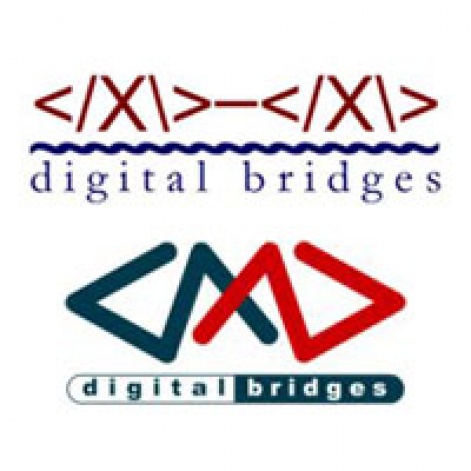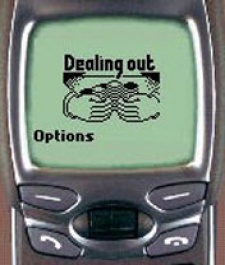While plenty of developers are talking up their plans for WAP games, Scottish-based wireless publisher Digital Bridges is already way ahead. Its game channel for WAP phones, Wirelessgames, is commercially live on servers throughout Europe.
There are three studios signed up to its developer programme: highly regarded Game Boy specialist Crawfish; local Scottish developer The Games Kitchen; and HandyGames, a German softco set up exclusively to develop for mobile games platforms.
More content and licensing deals will be announced shortly, including one with Lionhead honcho Steve Jackson for a text-based multiplayer adventure. In six months time it expects its servers to be supporting 20,000 games a day.
So it was no wonder that when we met up with CEO Kevin Bradshaw, business development manager Chris Wright and senior games designer Adam Mayes at E3 2000, they were in enthusiastic mood.

"I think that in two years time E3 will be a very different place," explains Chris Wright (pictured). "Companies like Nokia, Motorola, Ericsson are going to be big players in the entertainment area and that will be good for the whole industry. There's going to be a large influx of money and a much wider range of games available. That's why we haven't just gone for hardcore games on Wirelessgames, we've also gone for the mass market."
The 18 games currently available on the site are split into three sub-brands. Primetime is for simple generic games such as tic-tac-toe and hangman, Casino for card and dice games, while Arena is the place where the more complex games will be rolled out. At present, it includes titles such as the turn-based beat-'em-up Fight KO.

And it's already proving popular. During the site's beta phase (with only four games available), the UK server was supporting around 1,500 game sessions daily. With the take up of mobile internet devices expected to be rapid, it shouldn't be too long before sites such as Wirelessgames are bigger than of any of the current PC online gaming sites.

"If you look at the biggest web game sites, they have about five million users. But I reckon we'll have at least that many WAP users by the end of the year," predicts a chirpy Bradshaw. "For example, if you look at Italy, five times as many people have mobiles as have PCs. So you only have to get 20 percent of the mobile user base onto WAP and potentially you've already hit those numbers. That's why we've spent a lot of time looking at server scalability."
It's this ambition that underlines why Digital Bridges is ahead of the pack. Instead of just making games for WAP phones, it is promoting itself as a channel for playing games through the mobile internet.

At the heart of this vision is its UNITY server technology. Using an Linux OS and Java servlets, UNITY not only optimises its graphical output for all the different WAP devices available but contains a unified lobby service, including buddy lists, chat rooms and a virtual currency, as well as running the account management needed for the different mobile networks. It's also designed to support persistent turn-based multiplayer games. Of course, it is possible to log onto the site using a PC and play someone using a mobile phone.
So it's no surprise that there are plenty of developers waiting to sign up for the UNITY SDK.
"We're looking for about ten developers in total," says Bradshaw, "But we are handpicking them because they need to be good at certain things, so all the developers can enrich one another."
This approach should mean that the already short game development time will be further lessened. For example, HandyGames has developed a 3D engine that will be made available to the other developers within Digital Bridge's programme. The goal is to let people concentrate on the creative side of making quirky games for what is presently a limited platform.
As Adam Mayes points out: "I'd love to do a collectors' card game. We have card games already up on the site, so half my job is done. I have all my objects, all my shuffling code, all my deck dealing code already done. I can just concentrate on the mechanic of the card game."
Yet for all its concentration on WAP, Wright is keen to point out that Digital Bridges is not a just WAP company.
"For us WAP is just the first thing. We're actually based around the wireless internet," he explains. "We were doing WAP a year ago because that's what the technology was, but we can deliver content to lots of different devices - they could be running browsers or Java or Symbian (the next generation PDA operating system). Our whole architecture's based around that. It just happens that the first games are coming out to WAP because that's what's available. We're already working on next generation stuff."
And it's the lure of the future rather than the limitations of current technology that's driving the Digital Bridges vision forward. It's expected that devices with colour screens and six times the data transfer rates of current phones will be available by the end of the year.
"There's stuff which I can't begin to talk about," says Mayes mysteriously. "Just think about the implications of a device with a useable amount of K: it would mean that you could play all your favourite 80s games on a phone. Then we'll tweak them and make them multiplayer."
[N.B. If you were wondering if Digital Bridges is still around, it is, just under another name. In 2005, it rebranded itself as I-Play.]























